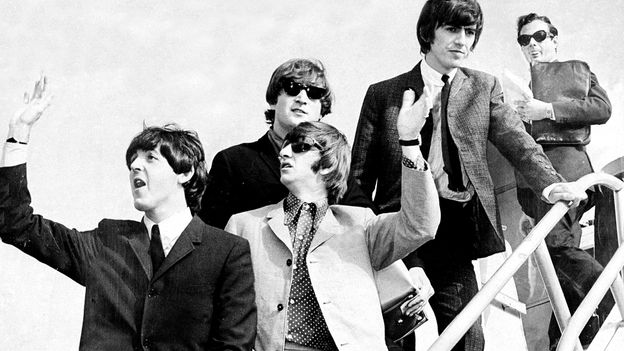But Epstein had taken a curious route to the world of pop, and Charlton noted that he still seemed to be something of an outsider. “He himself doesn’t seem part of this world, and yet he’s genuinely absorbed by young people and young enthusiasms,” Charlton said.
Born in 1934, Epstein was the eldest son of a Jewish family that ran a successful retail business in Liverpool. He hoped to pursue a career in something creative, but his family had other plans for him. “When I left school, at the age of 16, I had ambitions to be a dress designer, and also to be an actor, but my family weren’t very keen on this, and I allowed myself to be swayed into going into the business,” Epstein told Bill Grundy in a BBC radio interview in 1964. “I think I was more anxious to leave school than anything else, which I didn’t enjoy very much.”
While working at the family business in 1952, he was called up for his mandatory National Service, becoming a clerk in the Royal Army Service Corps. But the regimentation of military life made him miserable. After seeing an army psychiatrist, who recommended him for an early medical discharge, he left to rejoin the family firm. However, he hadn’t given up on his acting aspirations, and persuaded his parents to let him enrol as a student at London’s renowned Royal Academy of Dramatic Art (Rada) in 1956.
Cleaning up The Beatles’ image
It was during this time that Epstein would acknowledge that he was gay. In the UK in the 1950s, homosexuality was illegal, and his life as a closeted gay man would leave him vulnerable to violent attacks, blackmail and the constant threat of imprisonment. In 1957, he was arrested by a plain-clothes policeman for “persistent importuning” outside the men’s toilet at a London Underground station. He received a suspended two-year sentence, dropped out of Rada, and returned to Liverpool. This time, when his father put him in charge of the record department at the family’s North End Music Stores (NEMS), he found his niche. His knack for predicting what would be a pop hit and his flair for creating eye-catching displays quickly turned the store into a magnet for Liverpool’s teenagers.
When a boy came into NEMS requesting a record by the Beatles, My Bonnie, he decided to seek them out, Epstein told Grundy in 1964. John Lennon, Paul McCartney, George Harrison and their then drummer, Pete Best, had recorded the track as a backing band for singer Tony Sheridan while they were in Hamburg in 1961 – leading Epstein to believe that they were German. The Beatles had now returned to Liverpool, and Epstein went to see them play a lunchtime session at the nearby Cavern Club, primarily with the intention of finding out how to order their My Bonnie record.
